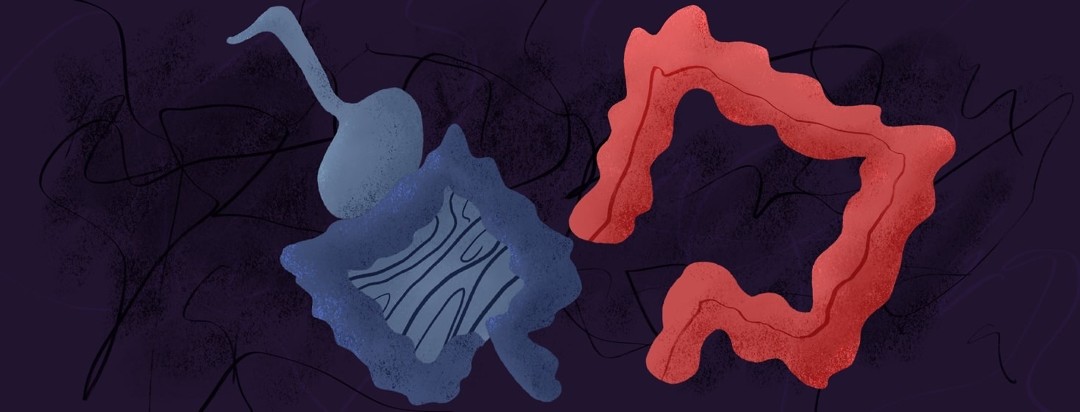Digestion Issues and Lupus
Reviewed by: HU Medical Review Board | Last reviewed: January 2020
Lupus can attack any tissue anywhere in the body, and the gastrointestinal (GI) tract is no exception. Estimates range from 20 to 70 percent of people with lupus experience some sort of GI complication at some point in their lives. This makes digestive issues extremely common in people with lupus though usually not serious.1-3
Lupus can attack any part of the GI system, including the stomach, intestines, liver, pancreas, bile ducts, gallbladder, and esophagus. It can be difficult for a doctor to tell whether lupus is the direct cause of a particular GI complication or is a side effect of medication or a malfunction in another organ caused by lupus inflammation. Here are some of the most common GI complications of lupus.
Trouble swallowing and GERD
Scientists estimate that between 20 percent and 70 percent of people with lupus experience esophageal motility disorder. The esophagus is the muscle that connects the throat to the stomach and its action moves food through the first parts of the digestive tract. Motility refers to the action of the muscle that moves food through the tube of the esophagus. When lupus inflames the esophagus people may have trouble swallowing (dysphagia) or stomach acids may creep up from the stomach causing gastroesophageal reflux disease (GERD). GERD is sometimes called acid reflux and causes heartburn or gas.1,3
Nausea, vomiting, diarrhea, and constipation
Nausea, vomiting, diarrhea, and constipation can be side effects of some of the drugs commonly used to treat lupus symptoms, especially NSAIDs and steroids. People with lupus are also more susceptible to infections if they are taking immunosuppressants, and these symptoms are common side effects of GI infections.1,2
If lupus attacks the intestinal tissue itself, irritable bowel syndrome may result because the intestines stop moving food properly through the system. People with lupus rarely also develop celiac disease, an autoimmune reaction to gluten.1,2
Ulcerative colitis and Crohn’s disease are different forms of inflammatory bowel disease. People with lupus sometimes develop ulcerative colitis (ulcers in the rectum and lower colon) but it is rare for someone with lupus to develop Crohn’s disease (inflammation of the digestive system). Bloody diarrhea and abdominal pain are common with both, but these are 2 distinct conditions.1,2
Peritonitis
The peritoneum lines the inside of the abdomen and when it becomes inflamed it is called peritonitis. Most cases of peritonitis are caused by infections, but sometimes lupus causes fluid build-up in the peritoneum. One study found that 60 percent to 70 percent of those with lupus had peritonitis.2 Depending on the severity, this may cause abdominal pain, nausea, vomiting, and constipation.1
Pancreatitis
When the pancreas becomes inflamed it is called pancreatitis. In people with lupus, pancreatitis can be caused by lupus attacking the pancreas, vasculitis (inflammation of the blood vessels), or by medications commonly taken by people with lupus, including steroids, immunosuppressants, and diuretics.1
Liver disease
Lupus can impact the liver, the body’s largest organ, in several ways. Lupus can cause a condition called hepatic vasculitis, which means the blood vessels of the liver are inflamed. This can cause blood clots in the blood vessels of the liver.
Autoimmune hepatitis, or liver inflammation due to an autoimmune disease like lupus, can occur at any age and occurs in women more often than men. Other GI complications of lupus, such as pancreatitis, peritonitis, anemia, and congestive heart disease, can negatively affect the liver.
Jaundice, enlarged liver, skin rashes, itching, abdominal pain, joint pain, nausea, vomiting, loss of appetite, dark urine, and pale or gray-colored stools are all symptoms of lupus-related liver disease.
Peptic ulcers
The NSAIDs people with lupus take for pain can make them more vulnerable to peptic (stomach) ulcers and the helicobacter pylori bacterium, which can cause ulcers.1
How are lupus GI complications treated?
The treatments for GI complications are as wide-ranging as the symptoms themselves.
Mild heartburn caused by GERD or medications like NSAIDs can be treated with over-the-counter antacids such as Rolaids, Maalox or Tums. For more serious heartburn, your doctor may prescribe a proton-pump inhibitor, histamine-2 blocker, or promotility agent. Heartburn and acid reflux may also be improved by changing your eating habits. Eating smaller meals, avoiding laying down after eating, and cutting back on caffeine can help you avoid heartburn.4
Gastrointestinal infections may be treated with bed rest, extra fluids, and antibiotics, if necessary.
How pancreatitis is treated depends on its root cause. Pancreatic vasculitis is treated with steroids while steroid-induced pancreatitis is treated by reducing or stopping steroid use.1
Autoimmune hepatitis is treated with steroids or an immunosuppressant. However, doctors must rule out that liver inflammation is not caused by medications like steroids first.1
Peptic ulcers may be treated with over-the-counter products such as Prevacid, Prilosec, or Cytotec.
